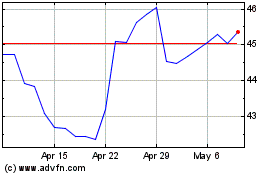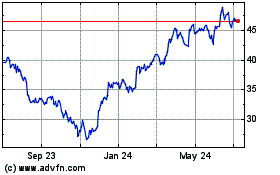By Nora Naughton and Mike Colias
The United Auto Workers will continue to picket General Motors
Co.'s U.S. factories until workers have approved a new labor deal,
prolonging a costly nationwide strike that is already the company's
longest in decades.
In a rare step, a council of union-hall leaders meeting in
Detroit voted to extend the walkout, in its 32nd day as of
Thursday. The vote came after negotiators reached a tentative
agreement with GM Wednesday for more than 46,000 UAW-represented
workers at the company's U.S. facilities. Typically, when
bargainers reach a deal, UAW leaders call off the strike.
The union's last contract with GM expired in mid-September,
which left members without a labor agreement to work under if they
had returned to work.
GM's hourly workers must still ratify the proposed four-year
contract through a majority vote, a process that is expected to
take a little over a week, lengthening a work stoppage that
analysts estimate has so far cost the company $2 billion or more in
lost earnings. UAW members at dozens of GM plants, parts warehouses
and distribution centers across the country will start voting on
the proposed contract Saturday.
GM, in a statement Thursday, said it encourages the UAW to move
as quickly as possible through the ratification process, so it can
resume operations.
The strike -- one of America's largest private-sector walkouts
in years -- has caused parts shortages at dealer repair shops,
stifled the auto-parts supply chain and led to temporary layoffs
for more than 10,000 non-UAW factory workers at GM in the U.S.,
Mexico and Canada.
The decision to lengthen the walkout comes even as the UAW
scored several wins on wages, health care and temporary workers in
the new labor accord. But GM will move forward with plans to close
three idled U.S. factories, including a plant in Lordstown, Ohio,
that President Trump and UAW leaders had pressed the company to
keep open. GM intends to sell the Ohio factory to a startup
electric-truck builder.
Ratification of the new contract isn't guaranteed, and
rank-and-file members could vote down the first proposed agreement
as Fiat Chrysler Automobiles NV factory workers did in 2015.
The agreement struck by union and company bargainers Wednesday
will move newer workers to the top wage in four years rather than
the eight years now, provide wage increases and lump-sum bonuses of
3% to 4% in each year of the contract and give temporary workers
full-time status after three years, according to details made
public Thursday.
The proposed contract also includes a $11,000 bonus for
full-time workers if the deal is ratified, as well as a $4,500
signing bonus for temporary workers, more than double their bonus
in 2015. The UAW succeeded in holding the line on health care, with
the 3% contribution workers pay for their benefits unchanged.
While analysts say the deal is likely to increase GM's labor
costs, the contract would let GM trim excess factory capacity in
the U.S., long a drag on its bottom line.
UAW leaders had also pressed GM during talks to move more
factory production from Mexico to the U.S., but no such commitments
were made in the final deal.
Missing from the UAW's contract summary was a breakdown of the
money GM will invest in U.S. factories, which the union has made
sure to highlight in past contract deals. As part of this
agreement, GM has pledged roughly $7.7 billion in new investments
for its U.S. factories, creating or preserving around 9,000 jobs, a
UAW spokesman confirmed.
Kristin Dziczek, an economist and labor specialist at the Ann
Arbor, Mich.-based Center for Automotive Research, said she was
surprised the UAW didn't provide details on the new company
investment. "That has been how they convey job security to
workers," she said. "I don't know how that will go over."
The UAW spokesman declined to comment on why GM's investments
weren't included in the summary.
Several GM workers said they were underwhelmed by the details
released Thursday on the new labor pact. It just seems like they
threw a bunch of money at us and expected us to sign off on it,"
said Greg Volker, 39 years old, who works at GM's factory in Spring
Hill, Tenn.
Others said they wanted more clarity on the language around
temporary workers.
"They need to explain it better," said Satoria Kemp, 27, a
temporary worker at a GM plant in Flint, Mich., who believes the
new contract could make her permanent in January but wasn't sure
yet. "They can be very tricky with their words."
The factory cuts are central to a restructuring plan GM laid out
last year, aimed at boosting cash flow by $6 billion annually. A
fourth plant that GM had slated for closure will remain open,
eventually to build an electric pickup truck, people close to the
talks said.
"We see the agreement to close three out of the four plants
initially targeted as a 'win' for GM, keeping their restructuring
plan on track," said Jefferies analyst Philippe Houchois in an
investor note Thursday. Still, any increase in labor costs for GM
will likely be replicated at Ford Motor Co. and Fiat Chrysler
Automobiles, with the UAW bargainers seeking to use the GM contract
as a template to reach similar agreements. GM shares fell 1.3%
Thursday and have fallen about 6% since the strike began.
--Ben Foldy contributed to this article.
Write to Mike Colias at Mike.Colias@wsj.com
(END) Dow Jones Newswires
October 17, 2019 18:59 ET (22:59 GMT)
Copyright (c) 2019 Dow Jones & Company, Inc.
General Motors (NYSE:GM)
Historical Stock Chart
From Mar 2024 to Apr 2024

General Motors (NYSE:GM)
Historical Stock Chart
From Apr 2023 to Apr 2024
